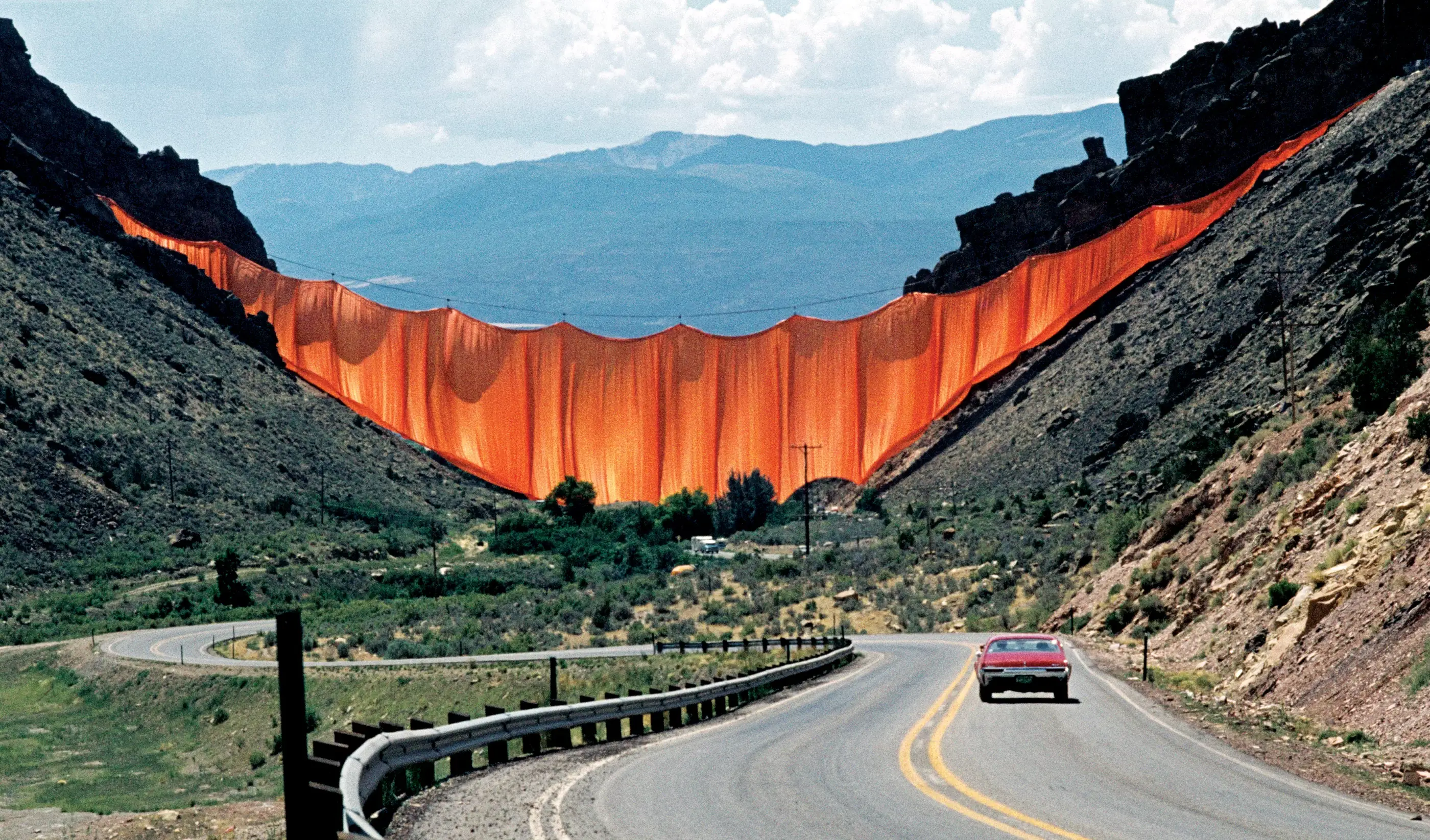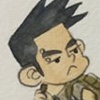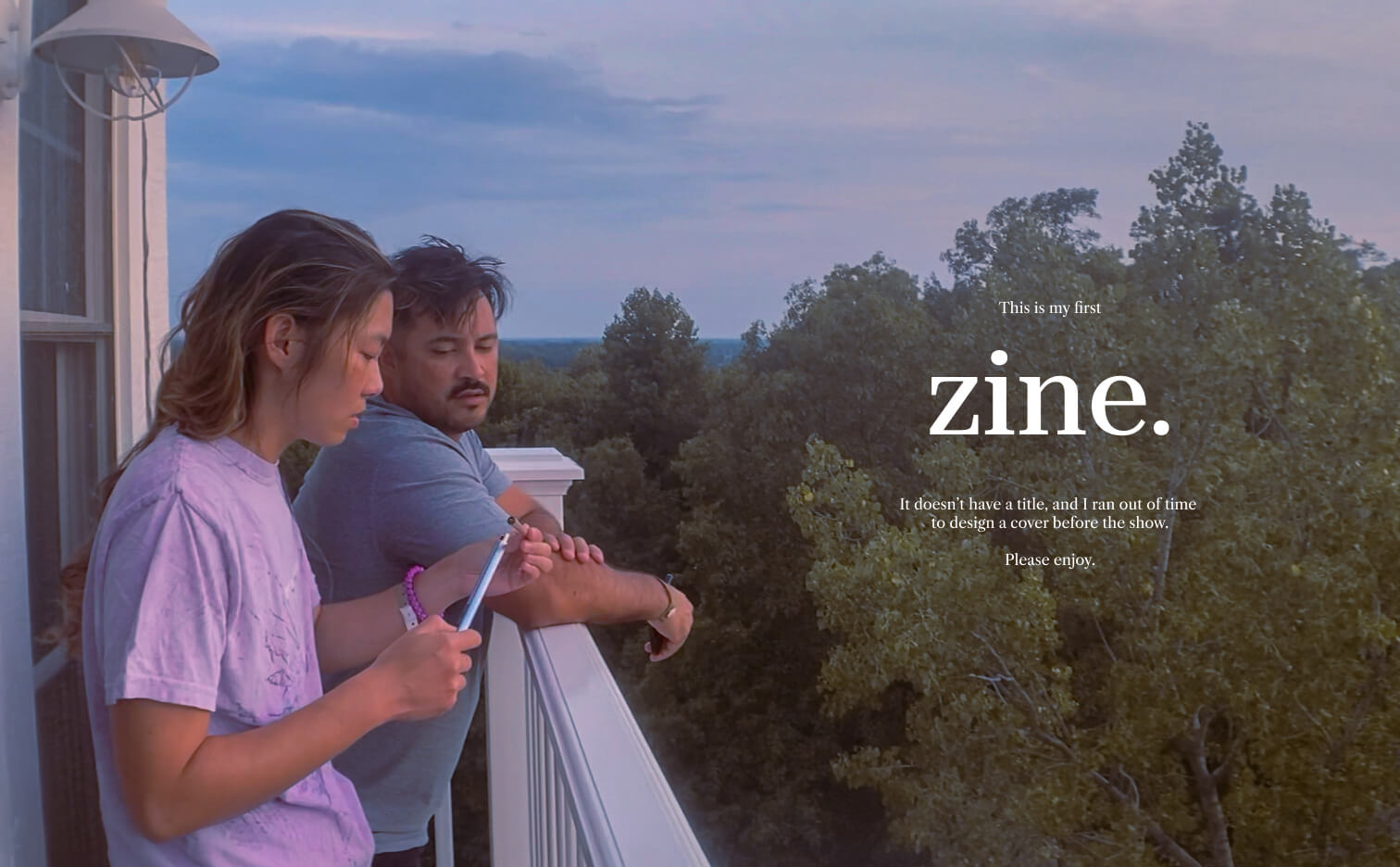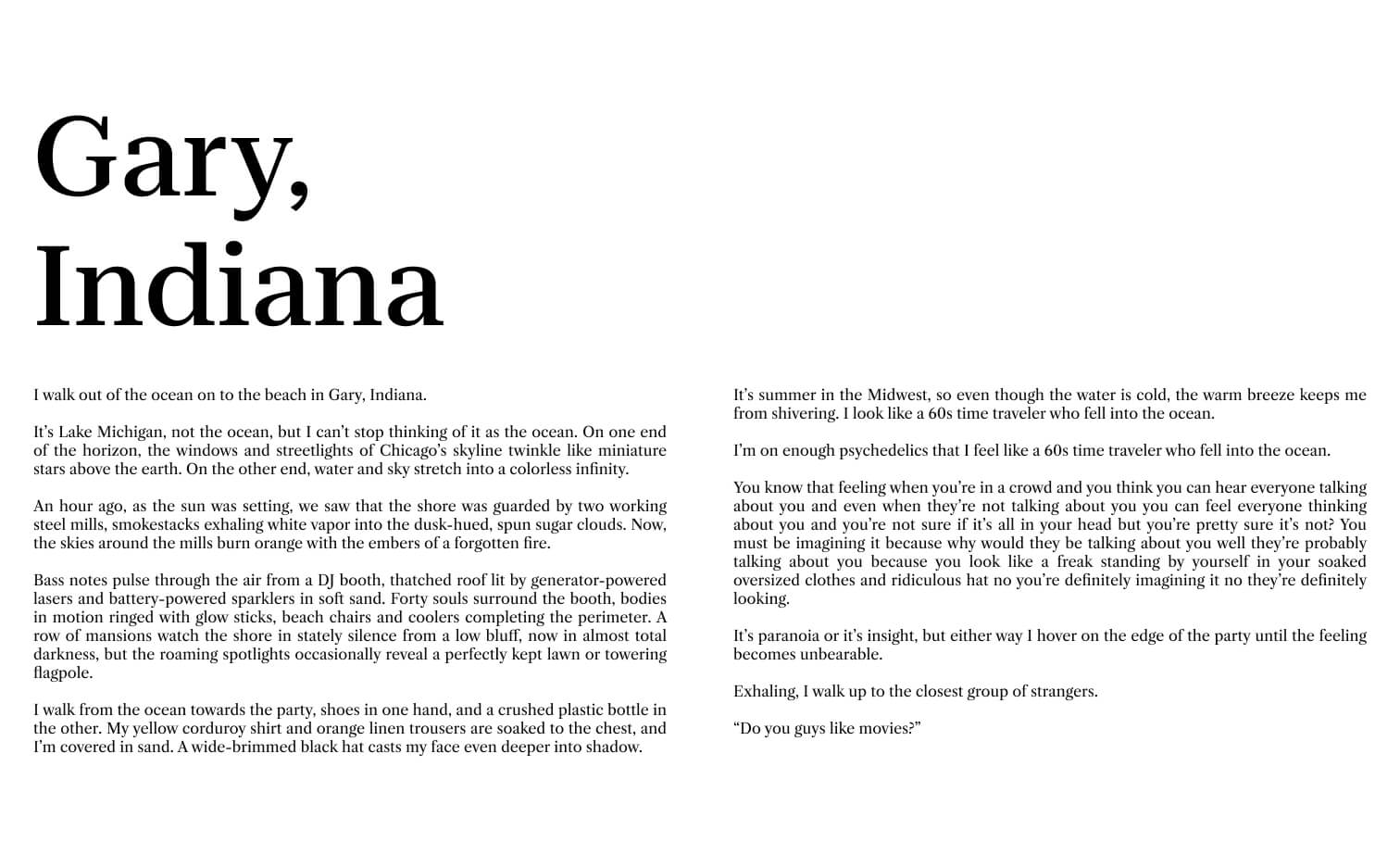Gary, Indiana
UPDATE: This post is now available as a zine, which IMO is the superior, canon reading experience.
Text-only version continues below.

Christo and Jeanne-Claude, Valley Curtain, 1970
I walk out of the ocean on to the beach in Gary, Indiana.
It’s Lake Michigan, not the ocean, but I can’t stop thinking of it as the ocean. On one end of the horizon, the windows and streetlights of Chicago’s skyline twinkle like miniature stars above the earth. On the other end, water and sky stretch into a colorless infinity.
An hour ago, as the sun was setting, we saw that the shore was guarded by two working steel mills, smokestacks exhaling white vapor into the dusk-hued, spun sugar clouds. Now, the skies around the mills burn orange with the embers of a forgotten fire.
Bass notes pulse through the air from a DJ booth, thatched roof lit by generator-powered lasers and battery-powered sparklers in soft sand. Forty souls surround the booth, bodies in motion ringed with glow sticks, beach chairs and coolers completing the perimeter. A row of mansions watch the shore in stately silence from a low bluff, now in almost total darkness, but the roaming spotlights occasionally reveal a perfectly kept lawn or towering flagpole.
I walk from the ocean towards the party, shoes in one hand, and a crushed plastic bottle in the other. My yellow corduroy shirt and orange linen trousers are soaked to the chest, and I’m covered in sand. A wide-brimmed black hat casts my face even deeper into shadow.
It’s summer in the Midwest, so even though the water is cold, the warm breeze keeps me from shivering. I look like a 60s time traveler that fell into the ocean.
I’m on enough psychedelics that I feel like a 60s time traveler who fell into the ocean.
You know that feeling when you’re in a crowd and you think you can hear everyone talking about you and even when they’re not talking about you you can feel everyone thinking about you and you’re not sure if it’s all in your head but you’re pretty sure it’s not? You must be imagining it because why would they be talking about you well they’re probably talking about you because you look like a freak standing by yourself in your soaked oversized clothes and ridiculous hat no you’re definitely imagining it no they’re definitely looking.
It’s paranoia or it’s insight, but either way I hover on the edge of the party until the feeling becomes unbearable.
Exhaling, I walk up to the closest group of strangers.
“Do you guys like movies?”
When I close my eyes, I see the American flag.
Not the original — I guess it’s not really the original. I mean not the mainstream, fifty states, red, white, and blue.
I see the flag with rainbow stripes. I see the flag in black and white, a blue band running across the center. I see Facebook ads demonstrating how to use a flag-adorned, skull-shaped piece of metal to disable the seatbelt safety features in cars, promising the freedom to live and die on your own terms.
In my altered state of mind, I can’t stop thinking about symbols and shorthand, and how symbols have to be a top ten human invention.
When I say “the American flag,” the outlines of a two-hundred-something-year history pop into your head. I don’t have to tell you that I’m thinking about individualism, diversity and discrimination, imperial power both militaristic and cultural, a storytelling, advertising, meme-making machine whose gravitational pull cannot be escaped.
When the American flag was first seen in China, in the 18th century, my ancestral province of Guangdong loved the thirteen stars and stripes so much they spread the word that it was “as beautiful as a flower,” and America became, for a time, the “flower flag country”.
“Why did you come to America?” S asks.
I struggle to speak. The synapses in my brain are firing in overtime.
“I talked about in my presentation, right? I came to America because when I was 17, my girlfriend in Malaysia told me that if I went to school here instead of the UK or Australia, I could avoid declaring a major for another couple years.”
“Okay…” She regards me. “But it’s been a long time since then. You could go somewhere else.”
I blink, once.
“America is an idea, right? Most countries — they exist because the people who make up that country have been there forever, they have the same background, whatever.
“America is different. Yes, there are people who were here before, but most of modern America is an idea. An idea that we don’t always live up to, but an idea that people from different backgrounds can come together and say, ‘We are a country not because we come from the same place, but because we believe in the same ideals’. And those ideals — call them liberty, equality, innovation, whatever — those ideals are always changing, and we’re always failing to live up to them… But they’re still there. We have so many immigrants, and the Statue of Liberty, and we hold these truths to be self-evident and blah blah blah.
“And America is so big, and so different, and there’s so many ways you can be here. It’s the best of times, and it’s the worst of times. We have Gary, Indiana and San Francisco, California. We invented global culture and MRNA and our people sleep on sidewalks between LEED-certified skyscrapers and mountains of trash. And even through our glaring imperfections, our ideals are still there. We can’t stop fighting about them. We can’t stop thinking about them.
“And I say ‘we’ now. Sometime in the last ten years I stopped saying ‘they’ and ‘you’ and now I say ‘we’. I hear you can spend three decades in Japan and not be Japanese. I feel American. America didn’t make it easy for me to stay, but I do. I chose to be here and I continue to choose to be here. I think there’s something special about being around people who are where they are because they choose to be, not because they have to be. Everyone still wants to come to America, with all our problems. And if I were in Malaysia I would say… Well my grandfather hopped onto the back of a truck to go work in a tin mine eighty years ago and that’s why I’m here.”
We pause for a long moment. I watch a woman twirl a hula hoop in front of the DJ.
“What about you? Why did you come to America?”
“Because I hate my parents.”
“Are you from around here?” I ask.
“Yeah, I grew up right over there,” He nods towards the darkness beyond the northern mill. “I’m guessing you’re not from around here.”
“You guessed right. This is a cool party though — honestly the last thing we expected to find out here. We were looking for the beach and kind of just wandered over.”
“Where from?”
“We have a house for the weekend ten minutes that way, but I actually grew up eight thousand miles away, and that’s something I’ve been thinking about a lot this weekend.”
“You’re a long way from home.”
“I am. Have you always lived here?”
“I’ve lived all around the world,” He smiles. “But I have family here in Gary, so I always come back.”
“Do you like it?”
“It’s changed a lot, but it’s home.”
Back when we were going to school in Columbus, we drove often to and from Chicago, which meant driving through Gary. The only thing anyone ever told us about Gary was to always make sure you had enough gas to make it through Gary without stopping.
A friend, or a friend of a friend, once told the story of how they stopped at a light in Gary while making the drive late one night.
Noticing the out of state plates, a cop car pulled up next to them, and motioned for them to wind down their window.
“Don’t stop,” said the cop. “Just drive.”
A buggy roars onto the dunes, interrupting my companion’s story. The buggy’s headlights are dim, but the undercarriage is lit by bright violet LEDs. The buggy loops around the party, kicking up a cloud of sand.
The crowd cheers.
“You can do anything in Indiana!” My companion shouts, over the din of the engine.
Without warning, there’s an issue with the generator, and the sound from the DJ booth cuts out. The purple, green, and orange beams are replaced by white floodlights illuminating floating sand particles. The smell of gasoline is sharp in the air as a small staff gathers to fix the problem.
Disoriented, the crowd in front of the booth begins to move back toward their coolers.
I lean towards my companion, and motion conspiratorially with my crushed plastic bottle.
“Have you watched Babylon? There’s a scene in the middle where they’re at a party and the music stops and the lights come on and Margot Robbie says, ‘I want to see someone fight a motherfucking snake.’ That’s how I feel right now. The music’s stopped, and the lights are on, I want to see someone fight a motherfucking snake.”
He chuckles. “I haven’t — I’ll have to see it.”
“Do you like movies?”
“I saw Barbie. It was good.”
“Did you see Oppenheimer? It was so good. And I didn’t know any of that stuff, about his life. The socialist part?”
“It was trendy then.”
“It’s trendy now!”
“True. I just think it’s so important to be able to think for yourself, you know? So many people don’t think critically. And not just about politics and ideas, but about other people. We have all these preconceptions of each other… But I can also understand why it happens. If you’ve only been treated poorly by someone who looks a certain way, you’re going to have certain generalizations about people who look that way.”
I say, “You know that line in The Great Gatsby? ‘Just remember that they haven’t had all the advantages that you’ve had’. I think about it all the time.“
He says, “When I was growing up here, my grandmother used to roll down the windows when we were driving around and shout the N-word at black people.”
I say, “My grandmother died on Monday.”
On Sunday, my mother texts to tell me that my grandmother is doing poorly, and that I should call her.
I call her, and she recognizes me, with assistance. We exchange the familiar script afforded by my limited mandarin. I tell her I’m doing well, she tells me to take care.
I can hear my extended family in the background shouting, laughing, groaning. Undeterred.
On Monday, I pick the cat up from the hospital, after his surgery. I’ve been watching a friend’s cat for three weeks, and after an uneventful start all my worst fears come to pass. His surgery is a procedure that takes a cat’s boy parts and makes them into girl parts. He needs the surgery because male cats, under the kind of stress that can arise when removed from family and routine, can develop a blockage that makes them unable to pee. The pressure builds up in their bladder, and they explode on the inside.
It’s a terrible way to die.
The surgery is nominally successful but the recovery is just beginning. Within hours, the room he has to be confined to — the only bathroom in my apartment — is covered in blood, shit, piss, and litter. I spend hours cleaning and caring.
Right before I go to bed that night, my mother texts to tell me my grandmother has passed. She tells me it was peaceful.
On Tuesday, I call my family at the funeral. They pass the phone around, and walk me through the parlor. Everyone waves to me, in good spirits.
My family is strong.
After hanging up, I walk back into the theater, and I watch Oppenheimer, a very good movie about giving up everything to get what you want, and about how sometimes your reward for getting what you want is spending the rest of your life dealing with the consequences.
On Wednesday, I talk to another sitter who will take over with the cat when I leave. We still don’t know if he’s going to recover, if one of us is going to have to take him back to the hospital today or tomorrow. He continues to eat a little, sleep a lot, urinate blood, knock over his water dish, pick at his stitches, and smear wet bloody kibble and litter across every surface in the bathroom. I open the door every few hours to find him in a crumpled ball, eyes closed and fur tangled. I check for his tiny heartbeat. I spend hours cleaning and caring.
On Thursday, I fly to O’Hare to spend the weekend with friends from college. The cabin trip is every year, and this year the cabin is in Gary, Indiana, on the shores of Lake Michigan, which I can’t stop thinking of as the ocean.
That night I have dinner at a restaurant with C, who won’t be joining us at the cabin. We talk about how after a near decade wandering the world, she’s finally found a place that feels like home, a community that feels like family, a life where she no longer feels like an outsider, in Chicago, that low-hanging constellation of windows and streetlights.
After we leave the restaurant, C tells me that the whole staff wants to know where I got my hat.
On Friday, we do at the cabin what we do every year. We arrive, slowly, over hours. We catch up, while we play the drinking games we learned in the days when we first learned about each other, but with a lot less coercion and a lot more care.
We say to each other, I hope we do this forever.
The cabin is always in the rural Midwest, meaning in neighborhoods with a different character than the big cities we mostly ended up living in. Lots of flags, some inevitable (MAKE AMERICA GREAT AGAIN), some angry (FUCK JOE BIDEN), some we can’t help but view as a sign of unwelcome for people who look like us.
One year, after a few drinks, we backed down from a scheme to steal the Confederate flag hanging over the porch of the house down the driveway.
This year, we call our trip CABINCON 2023, and prepare to speak in front of each other with slides about our life. We make lanyards of the conference schedule that say VIP SPEAKER in the front, and VIP DRINKER in the back.
At the FedEx where we print the lanyards, the lady behind the counter wants to know where I got my hat.
On Saturday, I stand in front of the group with my slides and spend five minutes summarizing the last ten years of my life, and how every decision I’ve made in that time, every decision I’ve made since coming to America, has been concerned with how can I make it more likely that I stay? How can I make it more likely that I get a visa? How can I make it more likely that I get a green card?
And now that I have my green card I need to relearn how to make decisions for myself, training a muscle that atrophied about halfway into its decade of disuse, and I tell everyone that I’m 90% sure I’m going to quit my job.
An hour before the sun is supposed to set, we eat a handful of mushrooms, set out for the closest shoreline, and walk, without warning, into that spectacular sunset and surprise DJ set.
As we stand there with our mouths hanging open, a man walks by and comments, “It’s good that y’all have your badges.”
“Buddy system, okay?” I remind everyone.
“No one should be wandering out here alone.”
I am alone, and painfully conscious of the way that I look.
I think of all the stories I’ve ever heard about an outsider killed for wandering through the wrong neighborhood.
The music pounds and I sway with my hat in my hand. Four days ago in Alabama, a man threw his hat into the air and hell broke loose.
I don’t throw my hat in the air. I feel an unbearable weight in my body. My stomach feels like it can’t contain everything I have inside me. I need to use the bathroom.
I think about how the cat was holding so much inside him that he needed surgery or he would literally die. I think about Indiana bathroom laws, and how it must feel, when you’re about to burst, to not know what you’re allowed to do, to feel like you have to choose between exploding on the inside and the possibility of incredible violence.
I feel symbols and narratives pushing against me. I can feel everyone on the beach looking at me. I’m not imagining it. I know how I must look. A 60s time traveler who fell into the ocean. An outsider, forever, across every dimension. I close my eyes and see the words CALIFORNIA LIBERAL HIPPIE COMMIE SOCIALIST FAGGOT FREAK.
I open my eyes and I see a black and white American flag with a blue band running across the center, flying from a flagpole on the lawn of a mansion on the bluff overlooking the shore.
The flag is shorthand.
It has to be shorthand, because there’s always more to the story.
One of the things that makes telling stories so difficult is that there’s always more to the story. And even if you somehow manage to tell the story the exact same way twice, it’s received differently depending on who hears it, on their awareness of the context.
Do you like movies?
In Babylon and Once Upon A Time In Hollywood, Margot Robbie plays the exact same scene twice. She goes into a showing for the first movie her character ever has a part in. She’s a new actress, and at first, the box office staff don’t even recognize that she’s in the movies. She sits there, in the dark, surrounded by an audience watching her perform for the first time. She’s nervous. An outsider, hovering on the edge of acceptance or rejection. Then they laugh. Cheer. Then she laughs, elated. They love her. She’s a star.
At the end of Babylon, her would-be protectors leave her alone for a moment, and she wanders out of the car into the night. We never see her again, and later we see a headline declaring her DEAD OF DRUG OVERDOSE AT 34. In her last scene, she walks out into the night, humming to herself, “Ain’t life grand?”
At the end of Once Upon a Time in Hollywood, she lives happily ever after. But I found out later that Tarantino rewrote the ending, and her character was based on a real life actress who died horribly. The Manson family broke into her house, tied her up, and stabbed her to death along with her unborn child.
It’s a terrible way to die.
I feel the unbearable weight of narrative, and I walk out into the ocean and fall to my knees.
My yellow corduroy shirt and orange linen trousers soak to the chest.
I see miniature stars on the horizon, almost within reach.
I’ve heard that in the moments before we die, our body releases a chemical similar to the active component in mushrooms.
Psilocybin can make minutes feel like hours. I’ve always wondered… If you’re 80 and you know you’re about to die, why not take five grams and give yourself 80 more years? If you’re 34, why not take five grams, live to 80 in your head, and then die? Walk out into the night on your own terms, before the world has a chance to get you?
What’s the difference, if it’s all in your head?
I turn my head and see my phone light up, on the beach where I left it.
It’s my friends.
The text reads, Come back soon?
I walk out of the ocean on to the beach in Gary, Indiana.
I am painfully conscious of the way that I look.
I feel like I’m about to be crushed by the pressure of simply existing.
I walk up to the closest group and I say, “Do you like movies?”
A woman dressed in all white smiles, and we exchange stories.
She tells me she grew up in Indiana, and went to a beach in Bali to find herself.
I tell her I grew up in Malaysia, and here I am on a beach in Gary trying to find myself.
She points at my lanyard and asks, “Are you VIP for this event?”
“Oh no, I made this for a different thing.”
She laughs. “Well you should be. You look like a piece of art, standing there.”
I tell her that I grew up eight thousand miles away, I spent the last ten years trying to get a green card and now I don’t know what to do with myself, and this has been the craziest week of my life.
She grips my arm and looks into my eyes. “You look too young to be saying all that. Can I give you a hug?”
She gives me a hug, and I let out the breath that I’ve been holding.
I drop my hat onto the sand.
His shirt is cut open at the sides down to the waist, revealing hard-fought size and strength I can’t help but see as primed for incredible violence. My mind is still twisted through with all the ways I don’t belong here, and our sharp contrast drives my circling doubts into a frenzy. His gaze catches me hovering alone on the edge of the party, and he starts to move towards me. My breath spikes.
He gets closer, and I see that his shirt reads SPREAD CHEEKS NOT HATE.
He points to my hat.
“You’re a badass,” he says. “I’ve been looking for a hat like that.”
I tell him that I grew up eight thousand miles away, I spent the last ten years trying to get a green card and now I don’t know what to do with myself, and this has been the craziest week of my life.
He puts a massive hand on me. It covers my entire shoulder. He looks me in the eye.
“You do what makes you happy. And don’t worry about anybody else. You hear me? Do what makes you fucking happy.”
I smile, a smile that reaches my eyes.
“That’s very wise. Where did you learn that?”
He leans in, raises that massive hand, and pounds his chest, twice.
“I learned it here. I listened to my heart.”
He offers me a bottle of Elijah Craig, and we swig.
“I got it from Amazon,” I say. “It’s a woman’s hat.”


